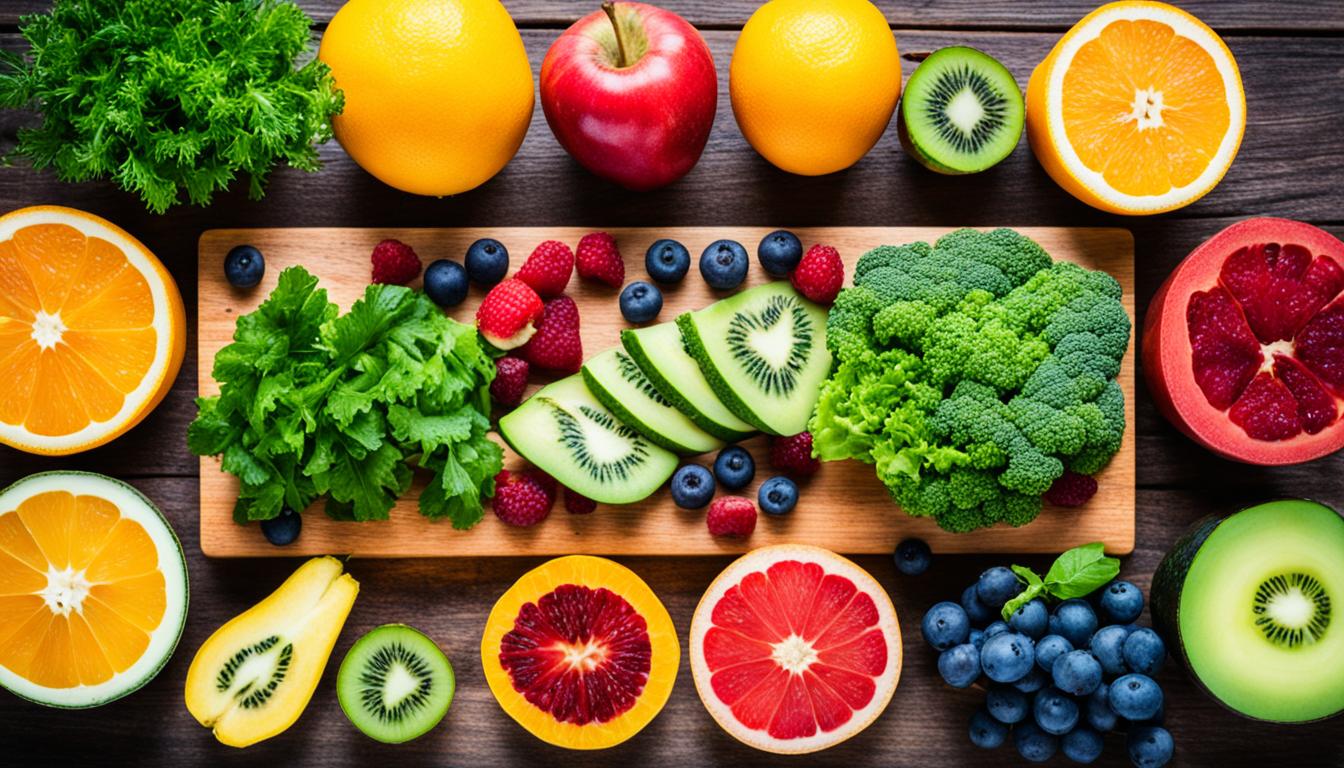About 42 million Americans deal with constipation every year, says the National Institute of Health. This issue means you might not go to the bathroom often or have trouble passing stool. But, there’s hope. Eating foods high in fiber can really help.
Even though fiber is known to ease constipation, most people in the U.S. don’t get enough of it. By adding certain foods to your diet, you can boost your digestive health. This can make constipation less of a problem.
Key Takeaways
- Approximately 42 million Americans experience constipation annually.
- Men are advised to consume around 38 grams of fiber daily, with only a third meeting this goal.
- A study demonstrated that eating 100 grams of prunes daily improved stool frequency in constipated subjects.
- Two kiwis a day can help relieve constipation effectively.
- Oatmeal, sweet potatoes, and whole grains are excellent dietary solutions for constipation.
Understanding Constipation and Its Causes
It’s key to know the causes of constipation and the symptoms of constipation to help manage it. Symptoms of constipation can really affect how you feel. So, finding and dealing with the root causes is important.
Common Symptoms of Constipation
Constipation shows in many ways, like:
- Passing stools fewer than three times a week
- Straining during bowel movements
- Hard or lumpy stools
- Sensation of blockage in the rectum
- Inability to completely empty the stool
Spotting these signs early can help you manage constipation better. Adding constipation-friendly foods to your diet can make a big difference.
Factors Contributing to Constipation
Several things can lead to causes of constipation:
- Insufficient fiber intake, mainly due to diets high in processed foods
- Inadequate fluid consumption, which keeps stools soft
- Lack of regular physical activity
- Ignoring the urge to have a bowel movement
- Stress and changes in daily routines, such as traveling
- Certain medications, including iron supplements and antidepressants
- Medical conditions like Irritable Bowel Syndrome (IBS) and hypothyroidism
Eating constipation-friendly foods like fruits, veggies, and whole grains can help. Regular exercise and enough water are also key. If you think your meds or a health issue is causing it, talk to a doctor.
The Importance of Fiber in Easing Constipation
Fiber is key to good digestion and helps with constipation. Eating foods high in fiber is a natural way to keep bowel movements regular. It comes in two types: soluble and insoluble fiber, each with its own benefits.
Soluble vs. Insoluble Fiber
Knowing the difference between soluble and insoluble fiber is crucial for managing constipation. Soluble fiber, found in foods like beans, oats, and apples, absorbs water to make a gel-like substance. This makes stool softer and easier to pass through your intestines. Insoluble fiber, in whole grains, nuts, and veggies, adds bulk to stool. It helps with regular bowel movements and prevents constipation.
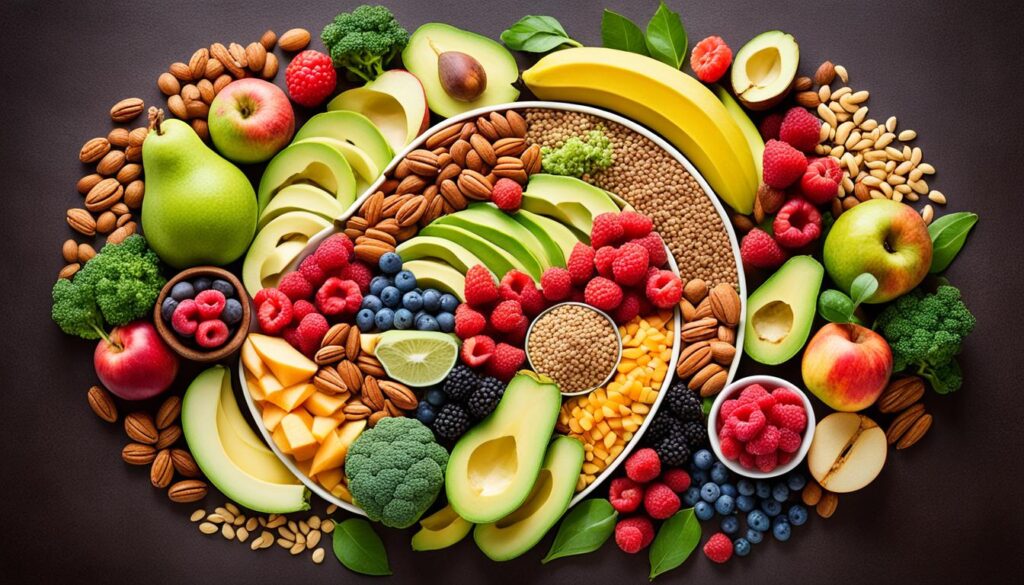
Recommended Daily Fiber Intake
Getting enough fiber is key to avoiding constipation. The USDA suggests women under 51 should get 25 grams of fiber a day. Men in the same age group should aim for 38 grams. But, most women and men don’t meet these goals. Eating more high-fiber foods can greatly improve your digestive health.
| Nutrient | Daily Recommendation |
|---|---|
| Women (ages 50 or younger) | 25 grams |
| Men (ages 50 or younger) | 38 grams |
| Women (ages 51 or older) | 21 grams |
| Men (ages 51 or older) | 30 grams |
Adding high-fiber foods to your diet helps manage and prevent constipation. This makes digestion smoother and more comfortable. Remember, increase fiber slowly and drink plenty of water to help it work well.
High-Fiber Foods for Constipation Relief
Adding more fiber to your diet is key for good digestion and avoiding constipation. Eating high-fiber foods every day can really help your bowel movements. These foods include fruits, vegetables, grains, legumes, nuts, and seeds. Each one helps make your bowel movements more regular.
- Raspberries: 8.0 grams of fiber per cup.
- Green peas: 9.0 grams of fiber in one boiled cup.
- Split peas: 16.0 grams of fiber per cup when boiled.
- Chia seeds: 10.0 grams of fiber per one-ounce serving.
Try mixing 1 cup of raspberries, 1 cup of cooked oatmeal, and half a serving of almonds into your meals. This mix gives you about 13.5 grams of fiber. It helps with easy and regular bowel movements. Also, a bean and vegetable salad can give you around 11 grams of fiber. This shows that eating a variety of foods can help you meet your fiber needs.
Experts say people over 2 years old should eat 14 grams of fiber for every 1,000 calories. For most adults, this means 28 to 34 grams of fiber a day. Sadly, only about 91% to 95% of adults get enough fiber. Eating more high-fiber foods can greatly improve your gut health.
Don’t forget to drink plenty of water with your fiber. Some fibers soak up water, which helps with digestion and bowel movements. Stay hydrated and stay active to get the most out of a high-fiber diet.
16 Foods That Help Constipation
Constipation can be tough on your comfort level. But, adding certain foods to your diet can make a big difference. We’ll look at how fruits, vegetables, grains, and legumes can help ease constipation.
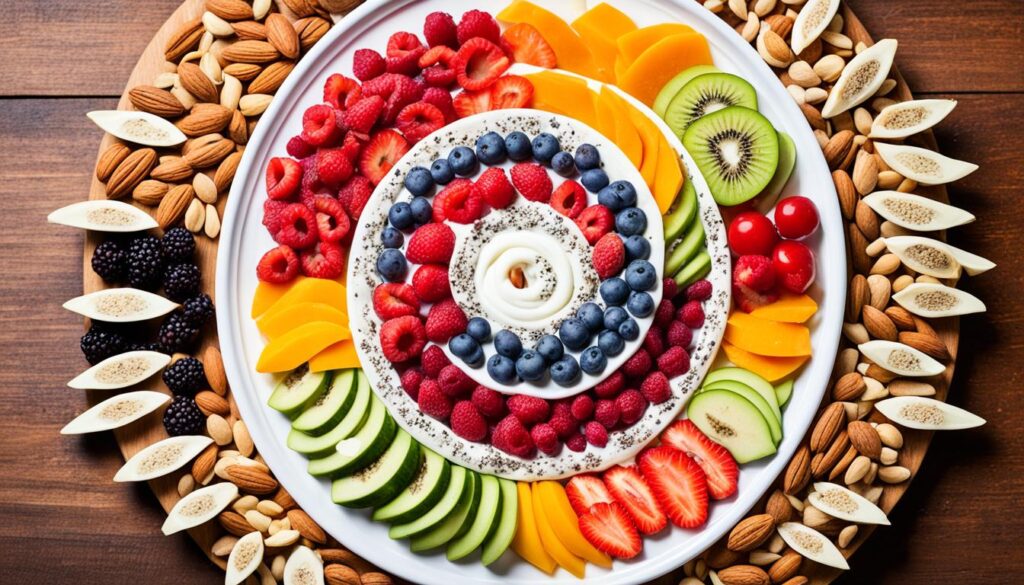
Fruit Choices to Boost Fiber Intake
Adding constipation-friendly fruits like prunes, apples, pears, and kiwis can boost your fiber. These fruits are full of sorbitol, a natural laxative. This helps keep your bowel movements regular. Prunes are especially good, with one cup offering over 12 grams of fiber.
Vegetables for Better Digestive Health
Adding digestive health vegetables like spinach, sweet potatoes, and artichokes can help your gut. These veggies have inulin, a fiber that makes stool bulkier and supports gut bacteria. A cup of cooked spinach gives you about 4 grams of fiber. Sweet potatoes are also great, packed with fiber and vitamins for your gut.
Grains and Legumes that Ease Symptoms
Grains for constipation like rye bread and oat bran, along with legumes for bowel health such as beans and lentils, are great choices. Fiber-rich rye bread and legumes like lentils can ease constipation. A cup of cooked lentils gives you about 15 grams of fiber, helping you meet your daily needs.
| Food | Fiber Content (grams) | Health Benefits |
|---|---|---|
| Prunes | 12 | Rich in sorbitol; natural laxative |
| Raw Kiwifruit | 2 | Modulates gastrointestinal motility |
| Cooked Spinach | 4 | Contains inulin; promotes gut health |
| Sweet Potatoes | 3.8 | Rich in vitamins and fibers |
| Rye Bread | 5.7 | Improves bowel function |
| Cooked Lentils | 15 | Supports regular bowel movements |
Nature’s Laxatives: Prunes, Sweet Potatoes, and Chia Seeds
Natural laxatives are a gentle way to help with constipation. They use nature’s gifts to keep digestion healthy. Prunes, sweet potatoes, and chia seeds are great for easing constipation and boosting digestive health.
Prunes and Sorbitol
Prunes are known for fighting constipation. They have about 6.1 grams of fiber and 14.7 grams of sorbitol per 100 grams. This mix makes the intestines take in more water, softens stools, and helps with regular bowel movements. Adding prunes to your diet can really help with constipation.
The Benefits of Sweet Potatoes
Sweet potatoes are also a great choice. A medium-sized one has about 3 grams of fiber. This includes both insoluble and soluble fibers. These fibers make stools bulkier and easier to pass through the digestive tract. Eating sweet potatoes helps with digestion and boosts your fiber intake.
How Chia Seeds Aid Digestion
Chia seeds are packed with fiber, having about 11 grams in just 1 ounce. When mixed with water, they form a gel that helps lubricate the digestive tract. This makes stool passage smoother. Adding chia seeds to your diet is a simple way to fight constipation and keep your digestive system healthy.
Choosing prunes, enjoying sweet potatoes, or adding chia seeds can greatly improve your digestive health. These natural laxatives can make a big difference.
Hydration and Its Role in Preventing Chronic Constipation
Drinking enough water is key to avoiding chronic constipation. It keeps your stool soft, making it easier to pass and less painful. Staying hydrated is vital for good digestion and bowel health.
Doctors suggest drinking 8 glasses of water a day for a healthy gut. Drinking fluids helps prevent hard, dry stools often seen with constipation. Adding water-rich foods like cucumbers, tomatoes, and melons to your meals can also boost hydration.
Studies show that staying hydrated helps prevent constipation and boosts productivity. Research in 1998 found that water helps fiber work better, making you go more often and cutting laxative use. In 2020, another study showed that mineral waters with magnesium improve digestion.
Being properly hydrated can also lead to better health. A 2014 study linked severe constipation to lost productivity. This shows why drinking enough water is crucial for digestive health.
| Hydration Strategy | Benefits | Examples |
|---|---|---|
| Drinking water | Maintains soft stool consistency | 8 glasses of water daily |
| Consuming water-rich foods | Enhances overall fluid intake | Cucumbers, tomatoes, melons |
| Using magnesium sulfate-rich mineral waters | Improves digestive motility | Natural mineral waters |
Foods and Habits to Avoid When You’re Constipated
Constipation affects about 16% of adults in the U.S. and up to 33% of those over 60. Knowing which foods and habits cause it can help you manage and prevent it.
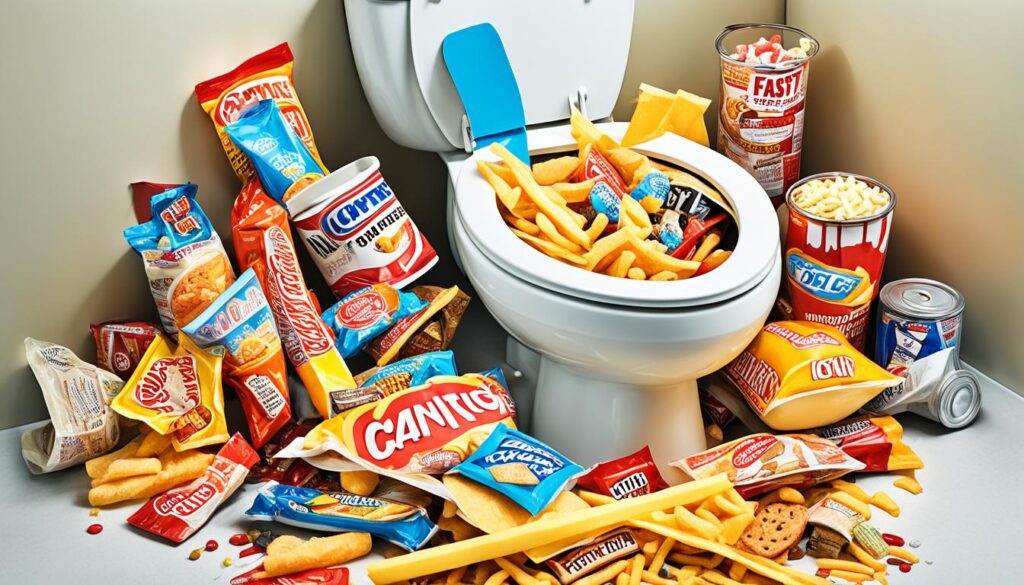
Foods That Can Worsen Constipation
Avoiding certain foods is key to fighting constipation. Foods high in salt, sugar, and fats make it worse. Refined grains, red meats, and fast foods have little fiber, making bowel movements tough.
Full-fat dairy like cheese and milk can cause constipation or lactose intolerance in some. Eggs, being low in fiber, can also lead to constipation in some folks.
- Refined Grains
- Red Meats
- Fast Foods
- Processed Snacks
- Full-fat Dairy Products
- High-Fat Meats (e.g., hot dogs, sausages, bacon)
- High-Sugar Foods
Lifestyle Factors Affecting Bowel Movements
Changing your lifestyle can help with constipation. Not getting enough fiber, water, or exercise, and ignoring your body’s signals are big problems.
- Poor Dietary Fiber Consumption: Increase fiber slowly to avoid discomfort, aiming for 25 to 30 grams a day.
- Inadequate Hydration: Drink lots of water, clear soups, and juices to help your gut move better.
- Lack of Exercise: Regular activity, like daily walks, helps keep your bowel movements regular.
- Ignoring Bowel Movements: Listen to your body to avoid constipation.
Knowing and avoiding constipation triggers can make your digestion better. Make these changes slowly to ease discomfort and see better results.
Other Natural Remedies and Tips for Constipation Relief
Looking for natural ways to ease constipation? Try regular exercise, probiotics, and staying hydrated. These methods can greatly help with this common issue.
Exercise and Physical Activity
Regular exercise is a top way to fight constipation. Activities like walking, jogging, or yoga help move food through your system. Exercise boosts digestion and overall health.
Probiotics and Gut Health
Probiotics in foods like kefir and yogurt support a healthy gut. They help balance the good bacteria in your digestive system. Studies show certain probiotics, like Lactobacillus plantarum, can make bowel movements more frequent.
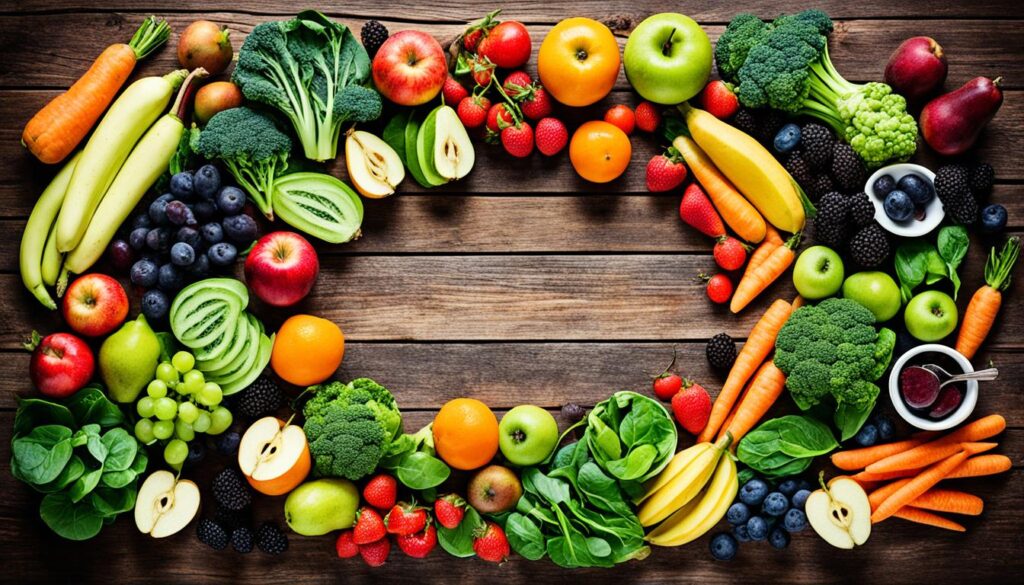
Staying Hydrated for Better Digestion
Drinking enough water is key for smooth digestion. It makes stools softer and easier to pass. Experts suggest drinking 125 ounces (3.7 liters) for men and 91 ounces (2.7 liters) for women daily.
Staying hydrated can really help prevent and manage constipation.
Conclusion
When looking for ways to beat constipation, combining high-fiber foods, staying hydrated, and living a healthy life is key. In the U.S., about 16 out of 100 adults struggle with constipation. This number jumps to 32 out of 100 for those over 60, showing how common this issue is.
Eating foods high in fiber is vital for better digestion. Foods like prunes, kiwi, flaxseed, and sweet potatoes are great choices. They can help you get more fiber. Legumes and vegetables such as black beans, lentils, and artichokes also help ease constipation.
Drinking enough water is also crucial. Not drinking enough water can lead to constipation. Avoiding alcohol, red meat, and fried foods can also help. Exercise can make bowel movements better, offering a full solution to constipation.
Understanding your body and making smart food and lifestyle choices is the best way to fight constipation. By eating more fiber-rich foods, drinking plenty of water, and choosing healthy habits, you can improve your digestion and overall health.
FAQ
What are the most effective natural remedies for constipation?
What are the common symptoms of constipation?
What factors contribute to constipation?
How does soluble fiber help with constipation relief?
How does insoluble fiber aid in constipation relief?
What is the recommended daily fiber intake to prevent constipation?
What are some high-fiber foods that help relieve constipation?
How do prunes help in relieving constipation?
What are the benefits of sweet potatoes for constipation?
How do chia seeds aid digestion and prevent constipation?
Why is hydration important in preventing chronic constipation?
What foods should be avoided when dealing with constipation?
What lifestyle changes can help alleviate constipation?
How do probiotics contribute to gut health and constipation relief?
Source Links
- https://www.menshealth.com/nutrition/a19518868/best-foods-for-constipation/ – 16 Foods You Should Eat When You’re Constipated
- https://www.healthline.com/nutrition/best-foods-for-constipation – 17 Foods That Can Help To Relieve Constipation
- https://www.eatthis.com/foods-to-help-you-poop/ – 16 Foods To Help You Poop Immediately
- https://kidshealth.org/en/teens/constipation.html – Constipation (for Teens)
- https://medlineplus.gov/ency/patientinstructions/000120.htm – Constipation – self-care: MedlinePlus Medical Encyclopedia
- https://www.healthline.com/health/constipation – Constipation: Symptoms, Causes, Relief, and More
- https://www.ncbi.nlm.nih.gov/pmc/articles/PMC3544045/ – Effect of dietary fiber on constipation: A meta analysis
- https://www.webmd.com/digestive-disorders/dietary-fiber-the-natural-solution-for-constipation – Dietary Fiber for Constipation
- https://www.mayoclinic.org/healthy-lifestyle/nutrition-and-healthy-eating/in-depth/fiber/art-20043983 – How to add more fiber to your diet
- https://www.mayoclinic.org/healthy-lifestyle/nutrition-and-healthy-eating/in-depth/high-fiber-foods/art-20050948 – How much fiber is found in common foods?
- https://www.eatingwell.com/7-day-high-fiber-meal-plan-for-constipation-8604139 – 7-Day High-Fiber Meal Plan If You Always Feel Constipated, Created by a Dietitian
- https://www.ncbi.nlm.nih.gov/pmc/articles/PMC4291444/ – Diets for Constipation
- https://www.health.com/foods-to-help-constipation-7562161 – Can’t Go? Try These 6 Foods That Are Guaranteed to Help You Poop
- https://www.verywellhealth.com/foods-to-ease-constipation-4143121 – Foods to Eat and Avoid When Constipated
- https://www.buzzrx.com/blog/foods-that-help-with-constipation – Top Foods That Help With Constipation
- https://www.tasteofhome.com/collection/foods-that-make-you-poop/ – Feeling Constipated? This Is What to Eat
- https://medium.com/@muhammadrizwanakhtar184/20-best-foods-for-relieving-constipation-1fbd151e8aa5 – 20 Best Foods for Relieving Constipation
- https://www.ncbi.nlm.nih.gov/pmc/articles/PMC8538724/ – Chronic Constipation: Is a Nutritional Approach Reasonable?
- https://health.clevelandclinic.org/constipation-6-hints-to-help-you-return-to-regular-bowel-movements – Constipation: 6 Tips to Help You Return to Regular Bowel Movements
- https://www.nhs.uk/conditions/constipation/ – Constipation
- https://www.health.com/foods-to-avoid-when-constipated-7508054 – Foods You Shouldn’t Eat When You’re Constipated
- https://www.singlecare.com/blog/foods-to-avoid-when-constipated/ – The best diet to relieve constipation
- https://www.medicalnewstoday.com/articles/constipation-diet-plan – Constipation diet plan: What to include and more
- https://health.clevelandclinic.org/home-remedies-for-constipation – 8 Home Remedies for Constipation
- https://www.health.com/condition/digestive-health/natural-remedies-constipation – What Is the Fastest Way To Relieve Constipation? 12 Options
- https://www.webmd.com/digestive-disorders/constipation-relief-tips – Constipation Relief Guide
- https://www.healthline.com/nutrition/foods-that-help-you-poop – 15 Healthy Foods That Help You Poop
- https://www.ncbi.nlm.nih.gov/pmc/articles/PMC8746799/ – Association between Dietary Factors and Constipation in Adults Living in Luxembourg and Taking Part in the ORISCAV-LUX 2 Survey
- https://www.thelanby.com/blog/foods-to-help-you-poop – The Best Foods to Help You Poop: Relieve Constipation Naturally | The Lanby

